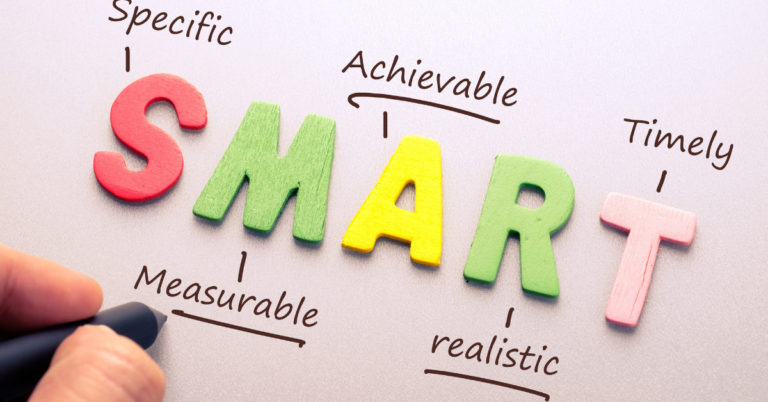Smart Goal Examples For Work: 10 Best Tips You Wished You Knew Sooner
Do you need smart goal examples for your work career? In this Era of social distancing and remote work, how do we keep up and improve ourselves? How do we set specific measurable attainable relevant goals that will benefit our career path?
Setting S.M.A.R.T Goals is part art and part science. Many people create goals that simply don’t work. At work, you don’t have the luxury of creating goals that don’t work. You need to work effectively and you need goals you help achieve just that.
By the end of this article, you will know the different types of professional goals, how to leverage smart goals in your work, and smart goal examples to give you a headstart in your new journey.
Table of Contents
What Are The Two Types Of Professional Goals You Should Focus On

Professional goals are triggers for growth in the career path we are in. They are the answer to the question: “where do you see yourself in six months, one year, or five years?”
The two types of professional goals we will focus on are our performance goals and personal development goals.
- Performance goals are related to tasks and projects that are expected of you. The goals you set for better results and a more effective workflow for example.
- Personal development goals aim to improve your skillset, polish your ability and increase your knowledge.
Before you craft an action plan, you need to envision a clear image of what you want to accomplish.
1. The more specific the better
Take the time to think about what you want. This is a crucial step you should not skip. The more you can drill down and get to the core of what you want to accomplish, the better you will do.
Specific goals are clearly defined with desirable outcomes, here are some questions that help you find out your smart goals.
Ask Yourself:
- Who do I need to accomplish this goal?
- What is the result I want?
- When do I want it done?
- How do I want to proceed?
- Why do I want to achieve this goal?
Repeat this process until you feel confident that you have a very specific goal. Now let’s move on to how you can evaluate how well you will do even before you start working on your goal.
2. How to measure your progress
In addition to having very specific goals, you need to keep track of your progress. This is a key component of your success, with clear criteria you can determine whether you are getting closer to your desired result or if you are falling short.
You need to set a list of key performance factors that you can refer to measure your progress and make the necessary adjustments. These criteria need to answer the following questions.
- How do I know if I have achieved my goal?
- What are my indicators of success?
These can be different depending on the goal you want to achieve. Figuring this out now will save you a ton of time later on.
3. Can you achieve this
There is no point in setting a goal that you can’t for some reason achieve. Smart goals need to be attainable. What you believe is achievable heavily depends on your level of confidence and your current level of skills.
You can always improve your performance and develop new skills. Your current goal is subject to a time limit, so you should consider how long you have to get it done.
Other factors can be outside of your control, like the company resources, the help available for your project, and much more. You can refer to these questions when setting your next goal.
- Do I have the resources to achieve this goal?
- Do I have the capabilities to reach this outcome?
- What am I lacking?
- Who has done something similar before?
4. Is this goal relevant to my work

Relevant goals match your unique objectives and should greatly benefit your company or business.
Align your smart goals to the company strategy. You can only get the best synergy if your goal matches the wider organizational goals of the company you work for. Knowing what they are and how you can contribute will greatly benefit you and the company.
Ask yourself:
- Is this goal relevant to this term’s goals? to my current project?
- Am I the right person for this task in my team?
- How does this benefit the company?
- Is it worth my time and effort?
The next tip helps you with efficiency and drastically improves your success rate.
5. When is this due
A set timeframe is what you need to wrap up the setting up phase of your goal. By giving it a due date you improve your focus and work more effectively to reach your goal.
If your goal does not have a deadline, you will lack the sense of urgency and the motivation that comes with it to achieve your goal.
What you need to ask yourself at this stage of your goal-setting process is when it starts and by what time you have to deliver.
If you made it this far you have what it takes to achieve big goals for yourself and your company. What you need to do is sharpen the saw, take the time to rethink and reevaluate your goals and adjust accordingly.
6. Get everyone on your team on the same page

Communication is vital for a fluid workflow and better results. So make sure everyone in the team knows what you are working on and how they can help. It goes without saying that you should be up to date with their tasks as well as providing assistance when requested.
So hold a meeting, send updates via emails, and personally talk to your colleagues.
7. Create a schedule to track your team goals
By making this public it keeps everyone focused and aware of the team’s progress. For more efficient performance, keep track of your goal and your teammates’ goals. Encourage feedback and review your goals regularly.
8. Collect feedback and optimize
The more you use this approach the more effective you will become. Be flexible and implement what is working in your goal-setting process and execution while removing what is not working well for your team.
Run surveys in your team to gather every member’s opinion and insights. Be critical but respect boundaries.
Feedback on your goals is valuable only when you learn from them and make the necessary adjustments.
9. Use technology to your advantage
With a variety of very good apps, setting goals, publishing them, and collaborating in real-time with your team is very easy to do.
With services like Monday.com, Notejoy.com, Clickup.com, and many more you can easily manage your team workflow and monitor the progress of your current goals.
10. Find new challenges for your role
Remember it’s either create or disintegrate. Research your company and your competitors to find what you can contribute as a new product or service. It shows your ambition, that you know your industry well and that you understand your company’s vision.
It works especially well if it’s something your company has always wanted to expand on but hasn’t for lack of skilled manpower. Take the extra time to figure it out and present your idea.
Smart goals and objectives examples

Performance goal examples
- Increase the blog posts per week from 3 to 5 for the new content marketing campaign for this term.
- Increase the company website’s online visitors from 50 per day to 150 by this month-end.
- Increase the conversion to leads by 20% by the end of the week.
- Increase the company brand awareness on Facebook by reaching 50000 like on the official page by the end of the year.
- Book 5 more sales calls per week by the end of the month.
- Increase the customer retention rate by 50% by the end of this term.
- Secure 35000 new customers online this term with Youtube Advertising at 20 dollars CPA (cost per acquisition)and break even with a new SLO (self-liquidating offer).
- Growth of the company CEO’s Instagram to 100000 followers by the end of this year.
- Increase the customer satisfaction ratings to 95% by the end of this year.
You get the idea, that these goals are closely related to the company’s overall goal and fall into your team’s expertise. It is essential to review your goals and adjust accordingly.
Personal SMART goal examples for work
- Improve presentation skills by presenting twice a week until mid-term.
- Improve report skills by taking an online course on Microsoft Excel intermediate level this month.
- Grow my circle of influence by having lunch with a client or a prospect three times a week starting this week.
- Boosting productivity by reducing coffee breaks at the cafeteria by half.
- Increase industry knowledge by attending seminars, workshops, and networking events at least once a month for the next six months.
- Increase product knowledge by spending 45 minutes every night learning about the company’s products and services for the next six months.
- Improve personal attitude by practicing gratitude and acknowledging at least one colleague per day.
Final Thoughts
These examples give you a head start. You can take it from here and develop tailored smart goals examples that are best for your work. Let us know what goals you will be working on. We are always happy to hear from you.
Check out our smart goals examples for business, they work wonderfully.






One Comment